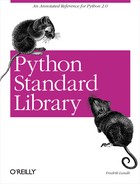“Anyone who considers arithmetical methods of producing random digits is, of course, in a state of sin.”
The random module contains a number of random number generators.
The basic random number generator (after an algorithm by Wichmann and Hill, 1982) can be accessed in several ways, as Example 2-29 shows.
Example 2-29. Using the random Module to Get Random Numbers
File: random-example-1.py
import random
for i in range(5):
# random float: 0.0 <= number < 1.0
print random.random(),
# random float: 10 <= number < 20
print random.uniform(10, 20),
# random integer: 100 <= number <= 1000
print random.randint(100, 1000),
# random integer: even numbers in 100 <= number < 1000
print random.randrange(100, 1000, 2)
0.946842713956 19.5910069381 709 172
0.573613195398 16.2758417025 407 120
0.363241598013 16.8079747714 916 580
0.602115173978 18.386796935 531 774
0.526767588533 18.0783794596 223 344Note that the randint function can return the upper
limit, while the other functions always return values smaller than
the upper limit.
Example 2-30 shows how the choice function picks a random item from a
sequence. It can be used with lists, tuples, or any other sequence
(provided it can be accessed in random order, of course).
In 2.0 and later, the shuffle function can be
used to shuffle the contents of a list (that is, generate a random
permutation of a list in-place). Example 2-31 also shows
how to implement that function under 1.5.2 and earlier.
Example 2-31. Using the random Module to Shuffle a Deck of Cards
File: random-example-4.py
import random
try:
# available in 2.0 and later
shuffle = random.shuffle
except AttributeError:
def shuffle(x):
for i in xrange(len(x)-1, 0, -1):
# pick an element in x[:i+1] with which to exchange x[i]
j = int(random.random() * (i+1))
x[i], x[j] = x[j], x[i]
cards = range(52)
shuffle(cards)
myhand = cards[:5]
print myhand
[4, 8, 40, 12, 30]
The random module also contains random generators with
non-uniform distribution. Example 2-32 uses the gauss
function to generate random numbers with a gaussian distribution.
Example 2-32. Using the random Module for Gaussian Random Numbers
File: random-example-3.py
import random
histogram = [0] * 20
# calculate histogram for gaussian
# noise, using average=5, stddev=1
for i in range(1000):
i = int(random.gauss(5, 1) * 2)
histogram[i] = histogram[i] + 1
# print the histogram
m = max(histogram)
for v in histogram:
print "*" * (v * 50 / m)
****
**********
*************************
***********************************
************************************************
**************************************************
*************************************
***************************
*************
***
*See the Python Library Reference for more information on non-uniform generators.
